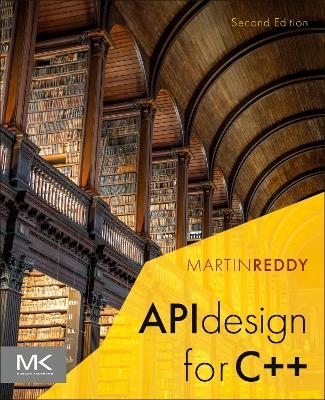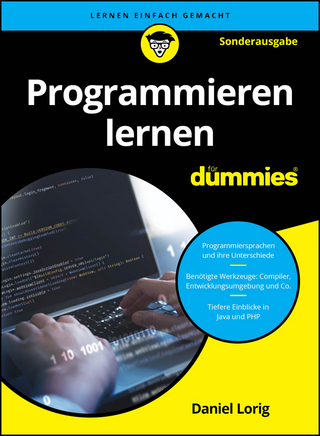
API Design for C++
Morgan Kaufmann Publishers In (Verlag)
978-0-443-22219-1 (ISBN)
The Second Edition includes all new material fully updated for the latest versions of C++, including a new chapter on concurrency and multithreading, as well as a new chapter discussing how Objective C++ and C++ code can co-exist and how a C++ API can be accessed from Swift programs. In addition, it explores often overlooked issues, both technical and non-technical, contributing to successful design decisions that produce high quality, robust, and long-lived APIs. It focuses on various API styles and patterns that will allow you to produce elegant and durable libraries. A discussion on testing strategies concentrates on automated API testing techniques rather than attempting to include end-user application testing techniques such as GUI testing, system testing, or manual testing.
Dr. Martin Reddy holds a Ph.D. in Computer Science and has over 30 years of experience in the software industry. He is a Fellow of the IEEE, a Fellow of the AAIA, and a Distinguished Member of the ACM. He has published 10 patents, over 40 professional articles, and 2 books. Martin was co-founder and CTO of the AI startup, PullString, where he oversaw the development of the company's technology until it was acquired by Apple in 2019. While at Apple, Martin was a software architect responsible for the architecture and APIs of major components of the Siri virtual assistant. Before that, Dr. Reddy worked for 6 years at Pixar Animation Studios where he was a lead engineer for the studio's in-house animation system. He worked on several Academy Award Winning and Nominated films, such as "Finding Nemo", "The Incredibles", "Cars", "Ratatouille", and "Wall-E". He was also the hair model for Mr Incredible. Martin began his career at SRI International where he worked on a distributed 3D terrain visualization system and co-authored the geospatial functionality in the VRML and X3D ISO standards. Martin was awarded Alumnus of the Year by his alma mater, Strathclyde University.
1. Introduction What Are APIs? What's Different about API Design? Why Should You Use APIs? When Should You Avoid APIs? API Examples File Formats and Network Protocols About This Book
2. Qualities Model the Problem Domain Hide Implementation Details Minimally Complete Easy to Use Loosely coupled Stable, Documented, and Tested
3. Patterns Pimpl Idiom Singleton Factory Methods API Wrapping Patterns Observer Pattern
4. Design A Case for Good Design Gathering Functional Requirements Creating Use Cases Elements of API Design Architecture Design Class Design Function Design
5. Styles Flat C APIs Object-Oriented C++ APIs Template-Based APIs Data-Driven APIs
6. C++ Usage Namespaces Constructors and Assignment Const Correctness Templates Operator Overloading Function Parameters Avoid #define for Constants Avoid Using Friends Exporting Symbols Coding Conventions
7. C++ Revisions Which C++ Revision to Use C++11 API Features Smart Pointers Explicit Member Functions Explicit Overrides and Final Enum Classes Function Objects Tuples Hash Tables Constant Expressions Null pointer constant Type aliases with using Unicode String Literals C++14 API Features The deprecated Attribute More Relaxed Const Expressions Binary Literals and Digit Separators C++17 API Features Nested Namespace Definitions Inline Variables Check for Header Availability Function Exception Specifications String Views Optionals Any Type Variant Container Byte Type C++20 API Features Modules Template Constraints and Concepts The Spaceship Operator The consteval Specifier Coroutines Version Header C++23 API Features Conditional Preprocessor Directives Multidimensional Subscript Operator Expected Values
8. Performance Pass Input Arguments by Const Reference Minimize #include Dependencies Declaring Constants Initialization Lists Memory Optimization Don't Inline Until You Need To Copy on Write Iterating over Elements Performance Analysis
9. Concurrency Thread Safety Avoiding Global Data Returning Data by Value The Use of static Initialization of Data Mutex Locking for Data Access Using Async Functions Promises and Futures Producer Consumer API
10. Versioning Version Numbers Software Branching Strategies Life Cycle of an API Levels of Compatibility How to Maintain Backward Compatibility API Reviews
11. Documentation Reasons to Write Documentation Types of Documentation Documentation Usability Inclusive Language Using Doxygen
12. Testing Reasons to Write Tests Types of API Testing Writing Good Tests Writing Testable Code Automated Testing Tools
13. Objective C++ and Swift Using Objective C++ within a C++ API Objective C++ wrapper for C++ API Using os_log and signposts Accessing an Objective C++ API in Swift
14. Scripting Adding Script Bindings Script Wrapping Technologies Adding Python Bindings with Boost Python Adding Ruby Bindings with SWIG
15. Extensibility Extending via Plugins Extending via Inheritance Extending via Templates
| Erscheinungsdatum | 01.06.2024 |
|---|---|
| Verlagsort | San Francisco |
| Sprache | englisch |
| Maße | 191 x 235 mm |
| Gewicht | 1330 g |
| Themenwelt | Mathematik / Informatik ► Informatik ► Programmiersprachen / -werkzeuge |
| Mathematik / Informatik ► Informatik ► Theorie / Studium | |
| Mathematik / Informatik ► Mathematik | |
| ISBN-10 | 0-443-22219-3 / 0443222193 |
| ISBN-13 | 978-0-443-22219-1 / 9780443222191 |
| Zustand | Neuware |
| Informationen gemäß Produktsicherheitsverordnung (GPSR) | |
| Haben Sie eine Frage zum Produkt? |
aus dem Bereich


